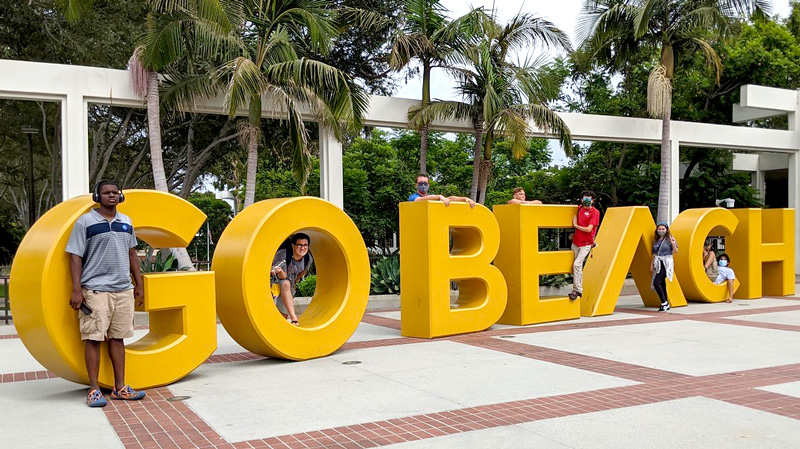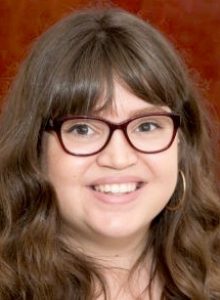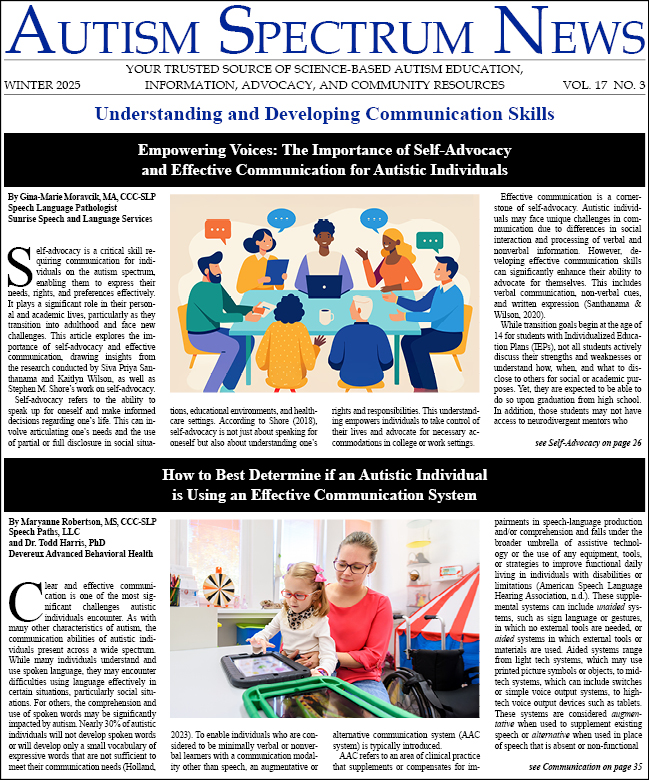As students with learning differences transition into college, one of the most important things they can do to set themselves up for success is to understand how to access support, services, and accommodations in college. Whether they are at the community college or university level, students must initiate the process to receive accommodations. This process can be very daunting for many but it is the first and most important step to achieving academic success and a positive college experience. At the College Internship Program (CIP), the academic team helps students navigate the transition from high school to college and understand how to receive, utilize, and maintain their accommodations and use resources as they begin navigating all that is college. CIP is a national transition program for students with autism and other learning differences.

CIP Long Beach students visit California State University Long Beach to learn more about accessing key academic accommodations
Initiating the Process
Once a student has been admitted into college, it is up to the student whether or not they want to disclose their disability and receive accommodations (Abreu et al., 2017). For those that are interested in receiving accommodations, the first steps include completing an orientation and submitting documentation such as their most recent Individualized Education Program (IEP) and/or testing. What follows next is an intake appointment with a disability counselor to review and explain to the student the accommodations available based on their documentation and discussion. From there, the student’s accommodation plan is created. Students are asked to review the college’s disability handbook prior to the meeting to increase their knowledge and awareness of what is available and the rights they have as a student registered with disability services (White et al., 2017).
Most of the time, students with learning differences are unaware of what accommodations they are able to obtain and may only receive common accommodations such as additional time on exams, a note-taker, and priority registration. Other accommodations students can qualify for include frequent breaks, preferential seating, double time on exams, campus liaison, peer mentor, and more (Gelbar et al., 2015). It is also important to note that students should ask their counselor how to utilize their accommodations such as a note-taker (e.g., What is the process to get a note-taker? Where do I check my notes?). To assist with being overloaded with information during the appointment, students may request a summary email from their disability counselor as a resource.
Requesting and Utilizing Accommodations
After students have registered and received their accommodation plan, they have to request their own accommodations at the beginning of the term for each of their courses. In college, students are put in situations where they must practice their self-advocacy skills. Even though the accommodation letter has been sent to the professor, it is up to the student to follow up throughout the term and ensure they have their accommodations secured in their classes. Some professors are not as familiar with how the process works regarding implementing the student’s accommodations. When this happens, it is important for the student to contact their disability office for assistance in the process of helping the professor understand how the accommodations work and make sure protocols are being adhered to (Elias & White, 2018).
Maintaining Accommodations and Resources
As the term progresses, students who stay in communication with their professors and disability office have shared having positive experiences in the college classroom (Petcu et al., 2021). In order to maintain accommodations, students can schedule meetings with their disability counselor in alignment with their college academic calendar. Many students schedule meetings with their counselor at least three times per term (beginning, middle, and end of the term). The check-ins throughout the term can benefit the student as they stay on track with their academic path. This will also assist in building the student’s confidence in using other resources outside of disability services such as tutoring for writing and math.
Students can also break down the sections of the syllabi to understand the structure of the course and highlight areas like exam and project due dates, email policies, and office hours. At CIP, students learn to insert professor’s office hours into their calendar, write down their exam dates and place reminders in their planner a week prior to the exam to know when to put in the request for additional time for exams. While also looking through the syllabi, students may want to consider adding and altering accommodations based on the course structure (e.g., 1.5x to 2x time). Outside of accommodations, many colleges also offer other resources such as career workshops and supplemental learning activities for various subjects from Reading to Math where students can receive additional assistance and participate in activities with other peers. Students who have been a part of these activities in tandem with utilizing their accommodations consistently have reported having higher engagement in college and grade point averages (GPA) (Abreu et al., 2017).
Conclusion
Although the process of obtaining and using accommodations can seem tedious, it serves as a good starting point for students with learning differences to familiarize themselves with their college campus until they feel confident to begin using other resources the college offers and find what resources work best for them.
Bree Tungate, MA, is an Academic Coordinator at The College Internship Program (CIP). She supports students in building the skills and confidence necessary to be successful in their courses and thrive academically. Bree has earned a Bachelor’s Degree in Family and Human Development from Arizona State University and a Master’s Degree in Child Development from California State University of Los Angeles.
The College Internship Program is a comprehensive transition program for young adults on the Autism Spectrum and with Learning Differences. Our Mission is to inspire independence and expand the foundation on which young adults with Autism, ADHD, and other Learning Differences can build happy and productive lives. For further information, visit www.cipworldwide.org.
References
Abreu, Marlene, et al. “Student Experiences Utilizing Disability Support Services in a University Setting.” Latest TOC RSS, Project Innovation Austin, 1 Sept. 2017, www.ingentaconnect.com/content/prin/csj/2017/00000050/00000003/art00002.
Elias R, White SW. Autism Goes to College: Understanding the Needs of a Student Population on the Rise. J Autism Dev Disord. 2018 Mar;48(3):732-746. doi: 10.1007/s10803-017-3075-7. PMID: 28255760; PMCID: PMC5581732.
Gelbar, N. W., Shefyck, A., & Reichow, B. (2015). A comprehensive survey of current and former college students with autism spectrum disorders. The Yale journal of biology and medicine, 88(1), 45–68.
Petcu SD, Zhang D, Li YF. Students with Autism Spectrum Disorders and Their First-Year College Experiences. Int J Environ Res Public Health. 2021 Nov 11;18(22):11822. doi: 10.3390/ijerph182211822. PMID: 34831577; PMCID: PMC8622457.
White, S. W., Elias, R., Capriola-Hall, N. N., Smith, I. C., Conner, C. M., Asselin, S. B., Howlin, P., Getzel, E. E., & Mazefsky, C. A. (2017). Development of a College Transition and Support Program for Students with Autism Spectrum Disorder. Journal of autism and developmental disorders, 47(10), 3072–3078. https://doi.org/10.1007/s10803-017-3236-8




